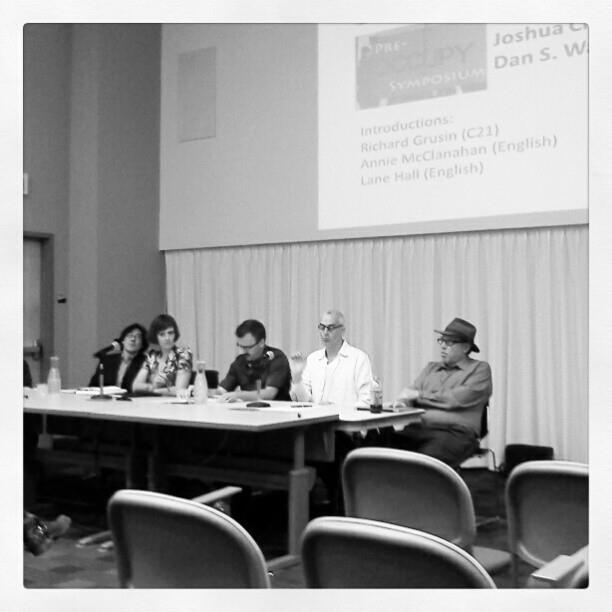By Zach Finch

The speakers at the Pre-Occupy symposium looked at the movement from multiple perspectives. They disagreed about whether the Occupy movement makes demands, and whether it should.
As all three speakers pointed out, one of the main features of the Occupy movement is that it does not make clear demands. Its lack of a manifesto, leadership, bureaucracy and other common features of political activist organizations/movements seem to position it as a fertile field in which something could grow. As one of my colleagues pointed out, the nature of Occupy is such that it fosters the creation of a space for new possibilities. However, I would argue that rather than a nebula of indeterminacy, Occupy actually has some very concrete demands and concepts.
Although Occupy makes no specific demands, it inhabits specific places at specific times. I think this action counts as a demand, and, based on his presentation, Dan Wang agrees. This connects to Wang’s point that Occupy demands to be recognized. It demands that people notice it as widespread and potentially powerful. Also, slogans such as “We are the 99%” are clear calls for social and economic justice. Again, there are no specific demands, such as increasing the corporate tax rate, but there is definitely a clear opposition. There are no specific villains, but rather it is a reflection, reaction, and attack on those who comprise the 1%. Therefore, one could assume that Occupy opposes any institutions, legislation, policies, practices and so on that favor the 1% at the expense of the 99%. While somewhat vague, this could certainly be interpreted as the demands of the movement.
At this stage, Occupy is nebulous and its demands are vague, but they are clearer than some might argue. The movement indeed does create a space for contingency and potentiality that may become something more concrete. However, that fact should not overshadow the reality that there is a purpose to the movement, and the key to that purpose lies in its distinction between the 99% and the 1%.
[Zach Finch is a PhD student at UW-Milwaukee in English-Media, Cinema, and Digital Studies. His research interests include national cinemas (particularly Scottish National Cinema), film genres (including Sci-Fi/Fantasy), and filmmaking history and techniques.]



